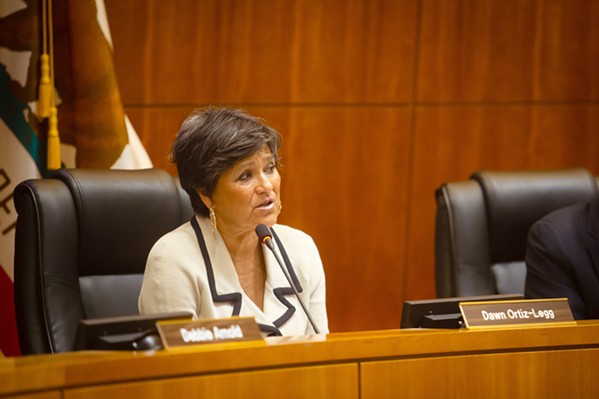[{
"name": "Newsletter Promo",
"id": "NewsletterPromo",
"class": "inlineCenter",
"insertPoint": "4",
"component": "15264767",
"requiredCountToDisplay": "0"
},{
"name": "Ad - Medium Rectangle CC01 - 300x250",
"id": "AdMediumRectangleCC01300x250",
"class": "inlineCenter",
"insertPoint": "8",
"component": "2963441",
"requiredCountToDisplay": "12"
},{
"name": "Ad - Medium Rectangle LC01 - 300x250",
"id": "AdMediumRectangleCC01300x250",
"class": "inlineCenter",
"insertPoint": "18",
"component": "2963441",
"requiredCountToDisplay": "22"
},{
"name": "Ad - Medium Rectangle LC09 - 300x250",
"id": "AdMediumRectangleLC09300x250",
"class": "inlineCenter",
"insertPoint": "28",
"component": "3252660",
"requiredCountToDisplay": "32"
}]
The San Luis Obispo County Board of Supervisors pumped the brakes on the cannabis business tax—scheduled for an automatic increase—after lengthy input from dissatisfied cannabis business owners.
"At 6 percent, we were able to hire two more people," Michael Joseph, a local cannabis business operator, told supervisors at the June 24 meeting. "We have intention of hiring three more. With the money that we're generating, that 2 percent difference is huge to us."
The supervisors voted 3-0 at the special meeting to freeze the cannabis business tax at 6 percent, holding it back from rising to 8 percent. Fourth District Supervisor Jimmy Paulding and 5th District Supervisor Debbie Arnold were absent.
The cannabis business tax arrived in unincorporated SLO County in 2018 after voters approved Measure B-18. It started out as a 4 percent levy on all cannabis-related businesses except for testing facilities. Beginning in 2020, it is designed to automatically increase by 2 percent each year every July 1 to a maximum tax rate of 10 percent. The tax reached 8 percent in fiscal year 2022-23 after which the supervisors voted to decrease it to 6 percent for the 2023-24 fiscal year.
While the 8 percent tax added $597,748 to the cannabis revenue for the 2022-23 fiscal year, the reduction to 6 percent raked in $702,071 in cannabis tax for the 2023-24 fiscal year.
"Our assumption is that that's the cannabis market recovering somewhat," Justin Cooley, the deputy director of the county Auditor-Controller-Treasurer-Tax Collector's Office, told New Times. "Wholesale price of cannabis really crashed the last couple years."
According to the staff report, the county is now bound to receive $750,000 in business tax revenue at the 6 percent rate for fiscal year 2024-25. It could have received $1 million in business tax revenue if the rate rose to 8 percent without supervisor intervention. Since the tax's inception six years ago, the county has received $2.5 million in total tax revenue.
The cannabis business tax hasn't been as lucrative for the county as expected. The SLO County grand jury scrutinized the value of the cannabis program and fee structure in a June 18 report called "Growing Pains: The Cannabis Industry in San Luis Obispo County."
"It has not been cost neutral as intended by BOS [Board of Supervisors] rule, requiring financial support from the general fund," the report said. "The majority of the cost for the cannabis program incurred to the county was funding the SOCCU [Sheriff's Office Cannabis Compliance Unit]."
The grand jury report added that the county supplemented the cannabis program's shortfall with general fund money worth $800,000 in fiscal year 2022-23 and $1.1 million in fiscal year 2023-24. It estimates a $950,000 general fund injection for fiscal year 2024-25.
Next year, the Board of Supervisors can choose to vote on maintaining the 6 percent tax rate or reducing it. If the supervisors don't take any action, the tax will automatically increase to 8 percent.
The grand jury report stressed that the legal cannabis program should be economically viable and beneficial to the community. It suggested adapting and modifying ordinances and fees in tandem with the evolution of the cannabis industry.
Cannabis operator and The Source owner Shawn Bean echoed the call for change at the Board of Supervisors meeting.
"There should be more levers to pull to generate revenue from this industry rather than increase the tax rate," he said. "Maybe things like ... walk-up storefronts. One of the issues we all know about is the current retail setup for delivery."
Third District Supervisor Dawn Ortiz-Legg expressed her support for the tax freeze with a mention of board deliberation on July 13 about adding more tools to help the legal cannabis industry. These include modified regulations pertaining to the expiration of cannabis cultivation, confirmed hours of operation for non-storefront retail dispensaries, and abatement procedures and cost recovery plans related to unpermitted cannabis activities.
Ortiz-Legg added that she'd eventually like to see a portion of cannabis revenue committed to advancing education and awareness pertaining to children.
"We want to have a moderate approach to this and one that works in conjunction with the Sheriff's Office to demonstrate that we can do both things in keeping with the law," she said. "I would like to see this stay because I want these guys to continue to be able to grow their business and flourish here." Δ
Latest in News
Comments
Showing 1-1 of 1
Readers also liked…
-

SLO police identify alleged driver who hit and killed couple
Dec 22, 2022 -

When the levee breaks: Oceano residents, county officials walk a tightrope of regulations to manage Arroyo Grande Creek, which some say led to the levee's failure in January
May 18, 2023 -

Cal Poly report highlights offshore wind's potential to spur green energy transition
Jun 8, 2023










